| Srl | Item |
| 1 |
ID:
176158
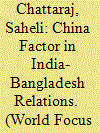

|
|
|
|
|
| Summary/Abstract |
The South Asian region is one of the least economically integrated regions in the world. Intra-regional trade remains well below its potential due to high transport costs, protectionist policies, and political tensions. The South Asian Association for Regional Cooperation (SAARC) agreements, the South Asian Preferential Trading Arrangement, and the South Asian Free Trade Arrangement, have failed to break down trade barriers.
|
|
|
|
|
|
|
|
|
|
|
|
|
|
|
|
| 2 |
ID:
176155
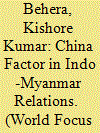

|
|
|
|
|
| Summary/Abstract |
Indo-Myanmar relations are marked by both paranoia and bonhomie because of a number of factors. Truly speaking, Myanmar is strategically important for India, especially in achieving its main goals of Look-East Policy launched under the P.V. Narasimha Rao-led Congress government to connect the Indian economy with the flourishing economy of neighbouring South East Asia. But, Prime Minister Narendra Modi’s Act East policy launched in 2014 aimed to counter growing Chinese influence and to gain more influence and connectivity with ASEAN states and beyond.
|
|
|
|
|
|
|
|
|
|
|
|
|
|
|
|
| 3 |
ID:
176153
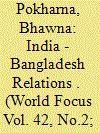

|
|
|
|
|
| Summary/Abstract |
India Bangladesh relations have improved significantly in the last decade since Bangladesh Prime Minister Sheikh Hasina took over office in the year 2009. Bilateral exchanges have taken place notably and regional group such as BIMSTEC, BCIM has also given opportunity to enhance bilateral and multilateral exchanges . Thus paper attempts to analyse India- Bangladesh relations keeping in view the recent developments.
|
|
|
|
|
|
|
|
|
|
|
|
|
|
|
|
| 4 |
ID:
176150
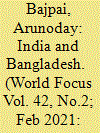

|
|
|
|
|
| Summary/Abstract |
India shares long historical, social and cultural ties with her neighbours in South Asia. India occupies a central and strategic position in the region due its size and geographical location, population, economic development, defence capability and technological capacity.
|
|
|
|
|
|
|
|
|
|
|
|
|
|
|
|
| 5 |
ID:
176146


|
|
|
|
|
| Summary/Abstract |
India’s relationship with Bangladesh and Myanmar is to be viewed at the back drop of continued hostility with China and Pakistan as well as its economic and developmental perspective. The strategy to achieve these ends are strengthening relation with its immediate neighbourhood, enhance developmental support and military assistance besides partnering to diffuse extremist activities across the border.
|
|
|
|
|
|
|
|
|
|
|
|
|
|
|
|
| 6 |
ID:
176154
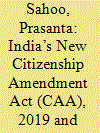

|
|
|
|
|
| Summary/Abstract |
India’s newly enacted Citizenship Amendment Act (CAA), 2019 and the National Register of Citizens (NRC) has put the most trusted India-Bangladesh relations on the test. Though both the neighbours share a largely cordial relationship with a shared history, culture, and a common destiny, the recent law has brought serious stress in the bilateral relations.
|
|
|
|
|
|
|
|
|
|
|
|
|
|
|
|
| 7 |
ID:
176159
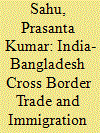

|
|
|
|
|
| Summary/Abstract |
India and Bangladesh continue to be related to disputes along the common border. The purpose of the paper is to explore those narratives which are local and based to the opposite of securitization process. The process of securitization is the dominant paradigm of security which affects the life of people who is somehow related with cross border activity for the variety of reasons.
|
|
|
|
|
|
|
|
|
|
|
|
|
|
|
|
| 8 |
ID:
176152


|
|
|
|
|
| Summary/Abstract |
India is all set to become a super power. America is shrinking, China is rising. It is hoped that after Covid-19, India will grow in (Tick mark) way but definitely not in the V shape as told by some experts. If India grows in this fashion, it will be touching something around 9 to 10 percent annual growth and that will make India Economic Super Power.
|
|
|
|
|
|
|
|
|
|
|
|
|
|
|
|
| 9 |
ID:
176148
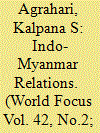

|
|
|
|
|
| Summary/Abstract |
This paper tries to analysis the recent trends of Indo-Myanmar bilateral relationship. It tries to unearth the factors that pushed New Delhi for readjusting its policies towards its north eastern neighbour. It also assesses the future prospects of Indo-Myanmar relations in the context of development, democracy,security, stability and growing Chines shadow in the Indian subcontinent.
|
|
|
|
|
|
|
|
|
|
|
|
|
|
|
|
| 10 |
ID:
176147


|
|
|
|
|
| Summary/Abstract |
Bangladesh is going to celebrate the golden jubilee year of her liberation in 2021. Significantly, the same year also marks the birth centenary of Sheikh Mujibur Rahman – popularly known as ‘Bangabandhu’ or Friend of Bengal and the father of the nation. India-Bangladesh Friendship Society observes 16 December as the Victory Day every year in memory of the day when Pakistan was comprehensively defeated by the Indian forces working in close alliance with the Mukti Fauj or the liberation army.
|
|
|
|
|
|
|
|
|
|
|
|
|
|
|
|
| 11 |
ID:
176160


|
|
|
|
|
| Summary/Abstract |
Growing geostrategic significance of Myanmar was highlighted during the second oath taking ceremony of India Prime Minister Narendra Modi on May 30, 2019, when he invited all the heads of BIMSTEC (Bay of Bengal Initiative for Multi-Sectoral Technical and Economic Cooperation) countries along with Mauritius and Kyrgyzstan.
|
|
|
|
|
|
|
|
|
|
|
|
|
|
|
|
| 12 |
ID:
176151
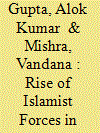

|
|
|
|
|
| Summary/Abstract |
Bangladesh is scheduled to celebrate its 50th anniversary on December 16, 2021. India announced that it would be celebrating a “Golden Victory Year” in the run-up to Bangladesh’s 50th Victory Day, and many events will be organised across India.
|
|
|
|
|
|
|
|
|
|
|
|
|
|
|
|
| 13 |
ID:
176157
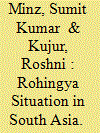

|
|
|
|
|
| Summary/Abstract |
The Rohingya Community has been facing a worst amount of persecution and subject to the human rights violations endangering their life, dignity and property, after the colonial rule. Various state actors have tried to shift the humanitarian responsibility resulting inhuman attitude not only by the state of Myanmar but also by the global society to some extent. The paper has tried to briefly focus on the historical events and the present deplorable situation of the Rohingya as a vulnerable Community in South Asia.
|
|
|
|
|
|
|
|
|
|
|
|
|
|
|
|
| 14 |
ID:
176149


|
|
|
|
|
| Summary/Abstract |
Power and international relations has an indelible link. But the concept and meaning of power have undergone a substantial change these days. Economic power has given an edge over military power; and the ‘hard’ dimension of power is getting more and more adaptive and accommodative to give space to ‘soft’ ones.
|
|
|
|
|
|
|
|
|
|
|
|
|
|
|
|
| 15 |
ID:
176156


|
|
|
|
|
| Summary/Abstract |
This article argues that becoming a responsible power in the Indo-Pacific serves the Indian foreign policy objectives. This will require closer and pragmatic diplomatic and bilateral ties with Myanmar. Regional cooperation is also important; however, in this article I argue that India’s bilateralism with Myanmar needs to be proactive and robust as well. Based on the analysis of the recent past, this article is an attempt to understand the importance given to Myanmar by India in the context of the Indo-Pacific.
|
|
|
|
|
|
|
|
|
|
|
|
|
|
|
|